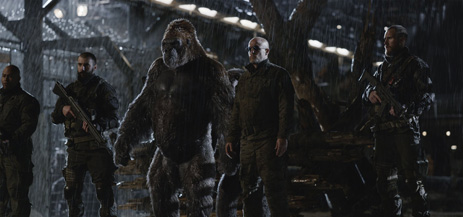The 400-Word Review: War for the Planet of the Apes
By Sean Collier
July 13, 2017
BoxOfficeProphets.com

I appreciate the effort. I applaud the resolve. Yet, in this case, it doesn’t work.
Two years after the events of Dawn of the Planet of the Apes, neither side of Earth’s new primate divide is doing well — disease has reduced humanity’s numbers to bare traces, but their superior firepower is still enough to keep the apes in the shadows. After a trite assault — a tired cliche doesn’t become fresh again just because it involves an ape — Caesar (Andy Serkis), de facto President of the Ape States of North America, leads a posse in pursuit of a ruthless human military capo called The Colonel (Woody Harrelson).
The tone of War for the Planet of the Apes is hard to place. A bizarre side caper involving a comic-relief ape voiced by Steve Zahn recalls nothing so much as The Wizard of Oz; the film’s opening chapter, admittedly a fine half-hour or so of filmmaking, feels like a Vietnam film (a point of reference made obvious by some conspicuous graffiti later in the film: “Ape-ocalypse Now.”) Yet textually, it seems that War — directed by Matt Reeves, who co-authored the script with Matt Bomback — is closest to a comment on the conflict between white Europeans and native Americans in the colonial era.
Which does give one much to think about, sure, and makes for plenty of poignant moments. It does not, however, make for an entertaining time. Much of the film is spent with some or all of the protagonists trapped in a makeshift prisoner-of-war camp by the Colonel’s forces, a period marked by little other than sullen glances and bitter speechifying by both sides. While Dawn elevated itself above the first film in this generation of “Apes” pictures via its sublime action sequences, those are almost entirely limited to the opening and closing minutes of War. The inter-ape conflict, which was the lifeblood of the previous film, is pushed mostly to the side until it is inelegantly resurrected in the film’s final moments — and resolved via firepower.
Ultimately, War feels like supplementary material — another story about things that happened to these characters. It is a DVD extra writ large; despite some interesting thoughts, viewers should expect, primarily, long stretches of boredom.
My Rating: 4/10
Sean Collier is the Associate Editor of Pittsburgh Magazine and a member of the Broadcast Film Critics Association. Read more from Sean at pittsburghmagazine.com/afterdark